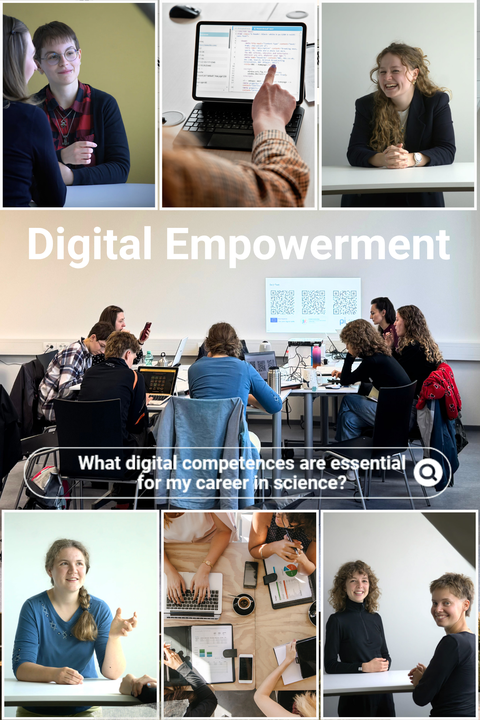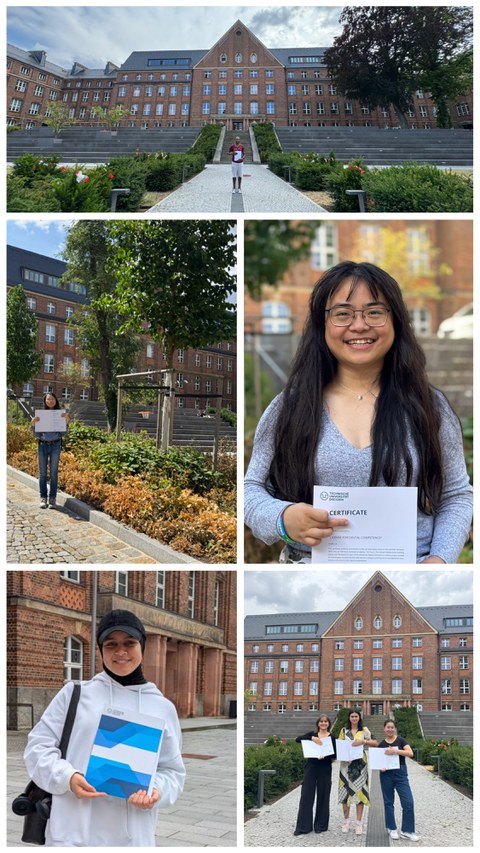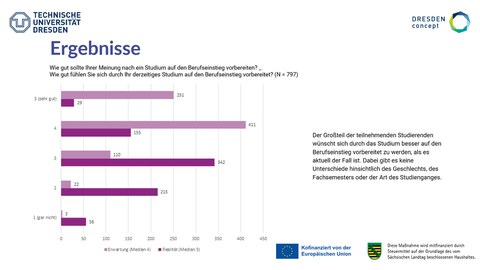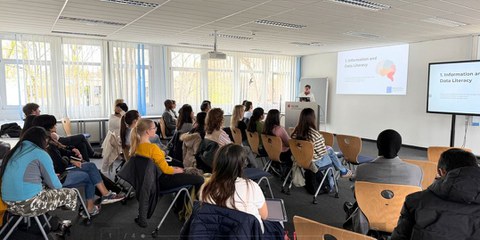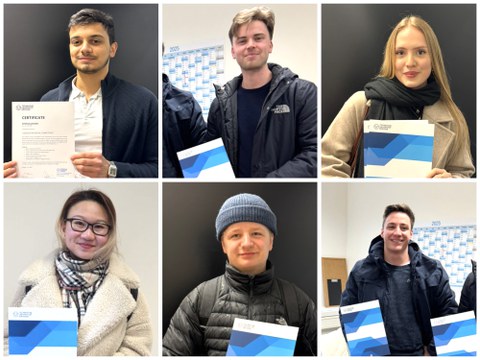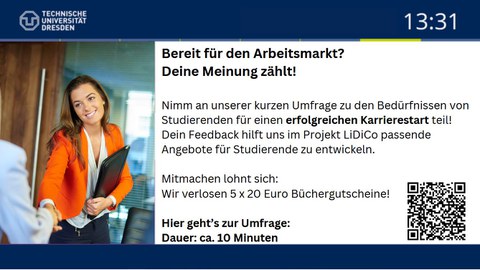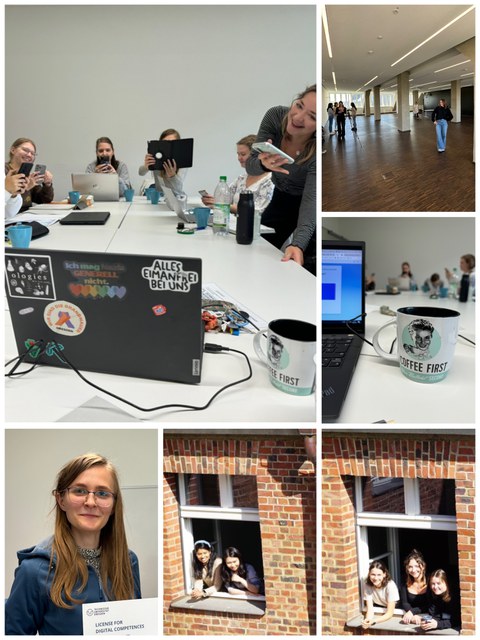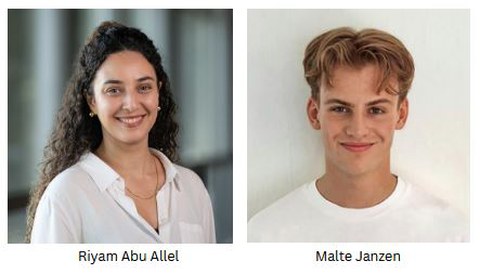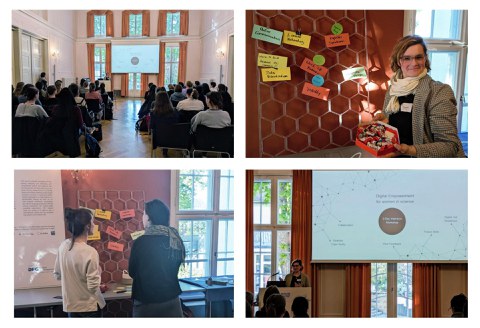License for Digital Competence
Project idea
LiDiCo offers a cross-faculty learning program based on the Virtual Collaborative Learning (VCL) approach. Students work virtually in small interdisciplinary groups on a practice-oriented case study.
Target group
Courses are open to students from all faculties and departments and are also offered in English so that international students can also benefit. We have a special focus on women to increase their visibility and equal opportunities in the job market.
Goal
The aim is to prepare the participants for the digitalized labour market and to strengthen their digital skills in accordance with DigComp 2.2. By the end of the project (March 2026), we plan to equip 120 people with the "License for Digital Competence".
This year, we were once again able to realize an exciting cooperation with the Service Center Studium. As part of the Join Science mentoring program, we held a workshop on digital empowerment. Join Science accompanies students from the STEM field who are aiming for an academic career in various phases of their scientific career.
Over the course of three workshop days, we worked with ten participants on their own digital skills, organization using digital tools, digital communication and visibility, networking and scientific writing with digital tools. There was also a photo shoot for profile pictures on LinkedIn or job applications and plenty of time for hands-on exercises.
We would like to thank the participants for their active participation, the exciting questions and impulses and for trying things out together, during which we also learned a lot!
In the summer semester, a total of five interdisciplinary and intercultural teams worked together for 12 weeks on the "Driving license for digital skills". Together, they created digital posters, presentations, videos, reflections, project reports and LinkedIn profiles.
It was particularly exciting for us as teachers to observe how the students developed very individual implementations from identical tasks. Each team gave their results a personal touch. The fact that a single task leads to five completely different approaches shows how versatile and original students can be when given the necessary freedom. In our course design, the focus is on the process of joint, digital development and its reflection rather than on pure results. The teams had the freedom to go their own way and try out different approaches and tools.
Over the weeks, we were able to recognize a visible development of the participants: They grew with the new challenges within the case study, worked on their ideas and strengthened their skills step by step. In the end, they left the course with an increase in knowledge, skills and self-confidence.
We would like to thank all participants for their great commitment over the last few weeks and wish them all every success on their future journey.
On July 2, 2025, we had the opportunity to present our experiences with the use of artificial intelligence in university teaching. We were able to raise valuable questions and initiate a discussion on higher education policy.
Main findings at a glance:
- LLMs as didactic co-designers: learning objectives can be linked to Bloom's taxonomy through targeted prompting and tasks can be formulated in the shortest possible time. This significantly reduces the amount of preparation required.
- Napkin.ai for visualizations: The tool is excellent for quickly and free of charge graphically displaying complex course sequences or content - vivid visualizations that promote understanding are created within seconds.
- Automated creation of rubrics: Assessment matrices can be generated at the touch of a button, which significantly improves the transparency and traceability of the assessment criteria and makes the assessment process more efficient.
- Didactic responsibility remains with the teacher: Despite the use of AI technologies, the responsibility still lies with the teachers, who should also act as role models in dealing with AI. They play a key role in promoting a reflective and responsible use of AI.
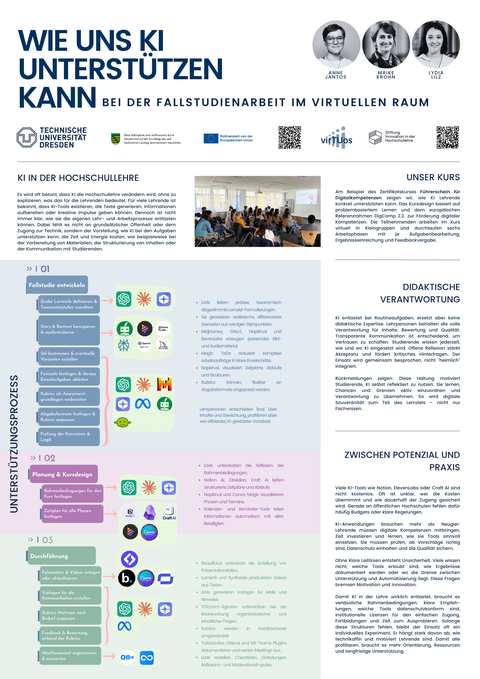
Das Poster veranschaulicht, an welchen Stellen in der Vorbereitung als auch Durchführung einer Lehrveranstaltung KI-Anwendungen unterstützend eingesetzt werden können.
What do the students say?
Our participants show a high level of acceptance of AI applications in teaching as well as a reflective attitude, provided that transparency and clear communication are guaranteed.
These findings underline the potential of AI as a supportive tool in university teaching and at the same time emphasize the importance of responsible integration by teachers.
In May, we had the opportunity to present the results of our survey "What do you need to enter the job market?" to colleagues, teachers and representatives of university didactics at the Center for Interdisciplinary Learning and Teaching at TU Dresden and to discuss them together.
Key findings
It was found that the majority of students would like to be better prepared for starting their careers than they are in their current degree program. There are no differences in terms of gender, semester or type of degree program.
Many students are concerned about the fear of discrimination: 252 students (31.6%) fear that their gender will affect their chances of starting a career. Age, ethnic origin, appearance and social background are then cited as the most common disadvantage factors. The correlation between gender and the number of perceived disadvantage factors is particularly striking: Women are significantly more worried - only 27.1% assume a career start free of discrimination, while almost half of other genders share this hope.
Finally, the results in the area of digital skills show that certain skills are seen as particularly essential for starting a career, while students believe that there is room for improvement in the promotion of these skills at university. Skills in using digital technologies to solve problems and in digital collaboration should be more strongly integrated into degree programs in order to be better prepared for the demands of the job market.
The presentation was followed by a lively discussion in the plenary session. Exciting questions arose such as: To what extent is a university degree course at all committed to preparing students for the job market compared to a degree course at a university of applied sciences or a dual study program? And can students assess during their studies which skills they will need later on?
Conclusions & outlook
The differences in the perception of disadvantage factors between the genders in particular show that women face specific hurdles when entering the world of work. This reinforces the need to develop support measures in a targeted manner for women in order to promote equal opportunities and optimally prepare them for their entry into the professional world. The findings will be directly incorporated into the further development of our course offerings so that we can respond to the identified needs in an even more targeted manner in future.
Another key conclusion from the survey is the need to make degree programs more practical and relevant to the profession and to promote digital skills. Universities are faced with the task of linking academic content more closely with the real requirements of the digital job market. This requires curricula to be adapted in a targeted manner and practice-oriented elements to be integrated to a greater extent. We are therefore also making the survey results available to TU Dresden's degree program development department in order to promote an even stronger focus on the requirements of students and the professional world.
We will shortly be publishing further insights into the survey and its results in our paper "Between expectation and study reality: Results of a survey on digital skills at TU Dresden" in the ZiLL anthology.
Our next "License for Digital Competence" course has officially started.
At the kick-off in presence, the most important foundations were laid for purely virtual collaboration in the coming weeks. The focus was on an introduction to the tools and the presentation of the case study. Personas are being used for the first time: as part of the kick-off event, students were able to choose a persona that best reflects their professional or personal interests in a targeted manner. All participants who chose the same persona then formed a team. This resulted in five teams that will work on our new case study together over the next few weeks, exclusively virtually. The focus of the content is on challenges in the context of starting a career in order to provide the participants with essential skills for a successful transition into the world of work.
Now the actual work phase begins - we are looking forward to the creative results of the student teams!
Last week we awarded 35 students with their "License for Digital Competence". In the weeks prior, the participants demonstrated their ability to analyze and solve practice-relevant problems in interdisciplinary teams.
They mastered the challenges of communication and collaboration in virtual environments, organized their teamwork effectively and test various digital tools. So they have laid an important foundation for their future digital studies and work life.
We congratulate all graduates on their achievement!
We recently took part in an exciting workshop on Education for Sustainable Development (ESD). We would like to use the insights gained from the workshop to further develop our "License for Digital Competences" course in order to not only teach our participants digital skills, but also to make a contribution to a more sustainable future.
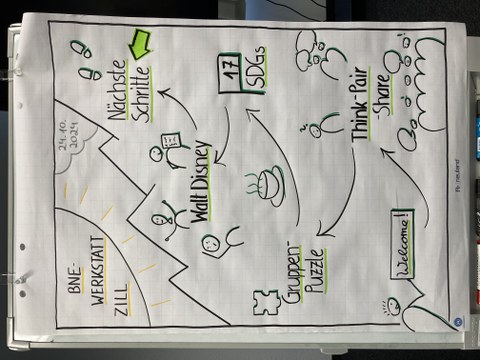
Methodology of the ESD workshop
A first point of contact is with Goal 4 of the UN Sustainable Development Goals: Ensure inclusive and equitable quality education and promote lifelong learning opportunities for all. In our course, we place great emphasis on promoting digital skills, which are essential in today's world of work. We want to ensure that all participants have the opportunity to navigate the digital world and continuously develop their skills. We lay the foundations to ensure that students are motivated and inspired to participate in the knowledge community beyond the course and develop an awareness of lifelong learning.
We also see a link to Goal 5: Achieve gender equality and empower all women and girls. We use gender-sensitive language in our course and present women in strong leadership roles within our case study. Our course prepares women in a targeted manner for the (digital) demands of the job market. In the future, we plan to develop further case studies in the STEM field so that women can test themselves in these areas before starting their careers. Introducing women to technical and digital topics at an early stage can boost their self-confidence and increase their career opportunities in the long term.
There is another important link to Goal 8: Promote sustained, inclusive and sustainable economic growth, full and productive employment and decent work for all. Our course provides targeted support for students who are about to start their careers. By teaching digital skills, we build a foundation that increases their access to and opportunities in the job market. By preparing participants for the demands of an increasingly digital world of work, we help ensure that they are not only better qualified, but also able to contribute to productive and sustainable work structures. Our approach aims to promote fair working conditions and support long-term economic growth through well-trained young talent.
Finally, our course also addresses Goal 9: Build resilient infrastructure, promote inclusive and sustainable industrialization and foster innovation. Our current case study on the development and integration of autonomous buses raises participants' awareness of the challenges and opportunities of improving connectivity between rural areas and urban centers. Through these topics, we aim to raise awareness of sustainable mobility and promote innovative solutions.
We look forward to integrating these aspects into our course and working together with our participants towards a more sustainable future.
Using the example of autonomous driving to strengthen digital skills and interdisciplinary collaboration
In the winter semester 24/25, the case study "ConnectDresden" is the starting point of our course. Participants take on the role of recent TU Dresden graduates and form a new team that is involved in the planning of an autonomous bus network in Dresden as part of a joint project.

KI-generiertes Bild eines autonomen Busnetzes der DVB in Dresden
The case study accompanies the participants over several weeks. In various tasks, they are confronted with complex and unstructured challenges they have to solve digitally. The tasks include researching and creating digital content, solving technical problems, maintaining a presence in digital media and dealing with false reports. During the course, participants acquire digital skills through practical experience, which are essential in today's job market.
The highlight: the complex tasks can only be solved in a team. The topic of autonomous driving offers the opportunity to bring together different specialist disciplines and train interdisciplinary cooperation. Thanks to the expertise from different subject areas such as IT, engineering and social sciences, students can examine the topic comprehensively from a technical, social and ethical perspective and develop creative, innovative solutions.
Participants also learn to reflect on themselves, to recognize their own role in the team and to understand its influence on the success of the group. In the course of the case study, the students take on increasing responsibility as we as mentors gradually withdraw from the process(fading).
The experiences from the course prepare participants for interdisciplinary projects in an increasingly networked and digital working environment.
In fall 2024, we will conduct a survey among TU Dresden students as part of our project to determine their needs with regard to starting a career. The aim is to ensure that our offers address the actual needs of students.
Various subject areas are examined, such as
- Preparation for career entry through the degree course.
- Possible disadvantages when entering professional life.
- The relevance and promotion of digital skills and other aspects such as project management, networking and self-reflection during studies.
The results of the survey will be used to further develop our courses so that they prepare students for the demands of the increasingly digital job market. In the long term, the results will also be incorporated into the development of degree programs and contribute to their further development.
Overall, the survey is an important milestone in achieving our central project goal: to provide students with support for their entry into professional life while meeting the demands of the modern job market.
The three-day workshop "Digital Empowerment for Women in Science" is behind us. Together with 17 participants, we explored various digital tools and strategies that can support not only day-to-day work, but also the implementation of long-term goals. The initial feedback from the participants speaks for itself:
- "Nice exchange and great boost" - The workshop offered valuable impulses that had a motivating effect and led to new ideas.
- "Cool new tools" - Many participants appreciated the variety of new, useful tools that they can now integrate into their daily work.
- "Nice atmosphere" - The relaxed and open atmosphere created space for lively discussions and creative exchange.
- "It was good to see the perspective of others" - The exchange with the other participants opened up new insights and broadened one's own perspective.
The workshop showed how digital tools can be used effectively to organize tasks, communicate and strengthen one's own network. Above all, however, everyone learned to appreciate the value of exchange and collaboration.
Our student employees Riyam and Malte joined the team in June. Malte will support us with data collection and project management, and Riyam will play a key role in organizing the mentoring workshop in September.
We are looking forward to working together!
We are pleased to announce an exciting development in our efforts to promote and support young female academics.
As part of the mentoring program of TU Dresden's Service Center Studies, we held a kick-off event where we had the opportunity to give a presentation and gather important topics and needs of our target group. This exchange gave us valuable insights into how we can tailor our program to effectively address the needs of young female scientists.
A highlight of our cooperation will be the implementation of a 3-day workshop on "Digital Empowerment", which is planned for September 2024. This workshop aims to equip participants with the necessary digital skills and tools to succeed in today's fast-paced scientific landscape. From developing technical skills to strengthening digital communication, workshop participants will learn how to effectively utilize digital resources to achieve their research goals and advance their careers.
What does it mean to work together on complex problems when team members come from different departments, are geographically distributed and digital tools structure the work process? Virtual Collaborative Learning (VCL) deals with this initial situation.
VCL is a didactic teaching/learning format that combines problem-based learning with collaborative group work in virtual environments1 Students work on authentic case studies that depict real professional challenges with the aim of stimulating action-oriented learning processes1 There is no "right solution" for these case studies, but rather several possible paths that must be negotiated, justified and further developed together. In this way, VCL promotes precisely those skills that are crucial in the digital age: Problem-solving skills, communication, self-organization and reflective collaboration1 Students work in groups that are as heterogeneous as possible and organize their collaboration largely independently2 The virtual environment is an integral part of the learning setting.
Four design dimensions for effective virtual collaborative learning
To ensure that VCL is more than just "group work in an online space", the format is based on four closely interlinked design dimensions:
- Realistic case studies that depict complex, professionally relevant problems
- A suitable technical platform that enables collaboration, communication and documentation (e.g. MS Teams)
- Professional pedagogical support that accompanies, structures and reflects on the learning process (by qualified e-tutors and/or other teachers)
- Learning analytics to make learning processes visible and enable feedback in a targeted manner 13
Only the interaction of these elements makes VCL an effective and sustainable learning format.
This is how a VCL project works

exemplarischer Prozessablauf einer VCL nach Altmann et al. 2024
A typical VCL project lasts three to eight weeks and combines synchronous and asynchronous learning phases. It starts with a synchronous kick-off event in which the objectives, process and expectations are clarified and the working groups are formed. The group work then begins. The students work on so-called "tasks" at regular intervals, each of which addresses different aspects of the case study and sets new challenges in a targeted manner. After each completed task, the groups receive differentiated, group-specific feedback that addresses both content-related and process-related aspects. The VCL concludes with a final presentation in which the solutions developed are reflected on and discussed. 1
You can find out more about the VCL concept here
Why Virtual Collaborative Learning forms the didactic backbone of LiDiCo
LiDiCo is designed as a cross-faculty, virtual learning program in which students from different departments work in small interdisciplinary groups on a practice-oriented case study. The Virtual Collaborative Learning approach fits in conceptually with this, as it enables collaboration across disciplinary, institutional and cultural boundaries and thus creates key prerequisites for such a format. Virtual group work allows low-threshold access for students from all departments and supports the involvement of international participants in a targeted manner through English-language elements. At the same time, diversity can be consciously taken into account in the group composition in order to strengthen visibility and equal opportunities, especially for women, in the digital work context.
At the same time, VCL allows digital skills to be promoted in a targeted manner without decoupling them from the learning context. Digital tools are used functionally as part of the case study work, communication and collaboration processes are reflected upon and self-organization and the assumption of responsibility are actively practised. Along the DigComp 2.2 4, students not only acquire technical know-how, but also develop a reflective understanding of digital work processes.
After completing LiDiCo, students can structure digital work processes in a self-organized manner, develop viable solutions for real problems in heterogeneous teams and further develop their own actions in the digital space in a reflective manner.
Footnotes
-
Altmann, M., Langesee, L.-M., Jantos, A., Cool, S., & Müller, C. (2024). Design Dimen-sions of Virtual Collaborative Learning - Synthesizing Iterative Research. In Thomas Köh-ler (Ed.), Handbook of e-learning (pp. 68-89). German Economic Service.
-
Balázs, I. E. (2004) Conception of Virtual Collaborative Learning Projects: A procedure for systematic decision making. Dissertation: Dresden University of Technology. https://tud. qucosa.de/api/qucosa%3A24468/attachment/ATT-0/
-
Jödicke, C., Bukvova, H., & Schoop, E. (2014). Virtual-C ollaborative-Learning-Projekte – Der Transfer des Gruppenlernens in den virtuellen Klassenraum. In Postgraduale Bildung mit digitalen Medien. Fallbeispiele aus den sächsischen Hochschulen, Medien in der Wis-senschaft. https://doi.org/10.25656/01:10562
-
Vuorikari, R., Kluzer, S., & Punie, Y. (2022).DigComp 2.2: The Digital Competence Framework for Citizens - With new examples of knowledge, skills and attitudes. Publica-tions Office of the European Union.
We are pursuing a holistic approach with our project: in addition to building digital skills, we place importance on developing other future skills that contribute to academic success and ultimately facilitate the transition to the world of work.
Understanding dropouts
Academic success is often defined as the opposite of dropping out. This is why we first took a close look at the reasons why students drop out. Research shows that dropouts are often due to a combination of different 1:
- Unfavorable entry requirements: A low level of information and the associated false expectations of studying or a strongly extrinsically motivated approach to studying (e.g. altruistic motives such as high earnings)
- Study conditions: Problems with the organization of studies and examinations or high demands can overwhelm students
- Lack of practical relevance
- Learning and performance difficulties
- Stressful life circumstances: personal and family problems
- Subject-specific challenges: The number of students dropping out is comparatively high in scientific and technical subjects
- Exam failures and missed deadlines: finally failed exams or exceeding the standard period of study
Gender-specific differences
The data shows that men tend to drop out of university more often than women. At universities, the dropout rate for men in the 2016 graduating class was 8 percentage points higher than that of women23
In the past, however, there have been hardly any gender-specific differences in the reasons for dropping out across many 4. Women are only disproportionately represented in drop-outs for family reasons, which are around 5.
Our solutions
Based on these findings, we focus on aspects that we can address in our courses. These include:
- Integration of strategies and tools to optimize self-organization in order to counteract problems with study or examination organization
- designing the case study to be as practical as possible in order to strengthen its practical relevance
- Measures to strengthen the self-confidence of students, especially women
- Making support services (e.g. student advisory services) and networks visible in order to provide access to effective solutions and the opportunity to network with people in similar situations
A large proportion of students drop out during the orientation or first-year6. In the long term, we are therefore planning to cooperate with TU Dresden's orientation year to make our courses accessible to prospective students and show how digital skills, strategies and tools can support an informed study decision.
Through our efforts, we hope to help students successfully complete their studies and make a good start to their careers.
Footnotes
-
Causes of dropout in bachelor and traditional degree programs. (2007). https://www.wissenschaftsmanagement-online.de/sites/www.wissenschaftsmanagement-online.de/files/migrated_wimoarticle/his_studie_abbrecher.pdf
-
Heublein, U. and Schmelzer, R.: The development of dropout rates at German universities. Calculations based on the 2016 graduating class. DZHW project report. Hanover 2018.
-
Klein, D. (2023). Social, ethnic and gender inequalities in dropout [, Freie Universität Berlin]. DataCite.
-
Diversity and dropping out in the age of Bologna. Conditional factors for dropout thoughts in the old and new degree programs at the University of Duisburg-Essen (2012). https://www.pedocs.de/frontdoor.php?source_opus=16284
-
Causes of dropout in Bachelor and traditional degree programs. (2007). https://www.wissenschaftsmanagement-online.de/sites/www.wissenschaftsmanagement-online.de/files/migrated_wimoarticle/his_studie_abbrecher.pdf
-
Sarcletti, A. (2020). Student success and dropout.
The Studium Generale at TU Dresden offers students a broad, interdisciplinary education with content from outside their degree program. It comprises over 120 courses per semester, which are offered by faculties, (student) initiatives and civil society organizations.
In order to be able to offer our AQUA and Studium Generale courses, we first analyzed the organizational requirements and derived the following framework conditions for us:
Course structure: Our course extends over 12 weeks and will largely take place online, so no physical rooms are required. No block courses or weekend courses are planned. The course starts with enrollment via OPAL and can optionally be continued on other platforms such as MS Teams.
Grading: Upon successful completion, students receive a certificate and 5 ECTS credits. Credit is awarded depending on the faculty, e.g. via a certificate of achievement. In certain degree programs, students must register for credits in the examination system.
The detailed report can be found here. The results should help other lecturers to implement similar courses.
We celebrate our project launch and present the vision of LiDiCo on our first poster:
 © Maike Krohn
© Maike Krohn
Research Associate
NameMaike Krohn M.Sc.
CampusConnect – Sharing Innovative Education; LiDiCo
Send encrypted email via the SecureMail portal (for TUD external users only).
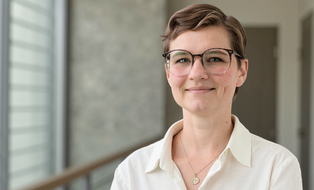 © Anne Jantos
© Anne Jantos
Research Associate
NameAnne Jantos Dipl.-HDL.
LiDiCo
Send encrypted email via the SecureMail portal (for TUD external users only).

Research Associate
NameClaudia Albrecht
Digital Teaching - School of Science, LiDiCo
Send encrypted email via the SecureMail portal (for TUD external users only).


